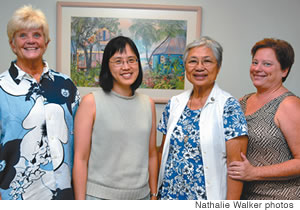Quality Rest-of-life Care
Interviewed by Melissa Moniz
Wednesday - August 05, 2009
E-mail this story | Print this page | Comments (0) | Archive
 Del.icio.us Share
Del.icio.us Share

Dr. Aida Wen
Medical director of St. Francis Palliative Care Consult Service, geriatrician
Interviewed By Melissa Moniz
How long have you been practicing?
Since 1998, so 11 years.
Since you started practicing, what have been the most significant changes within the field of geriatrics?
I’ll backtrack a little bit. During my training in geriatrics, I realized that a large number of my patients were terminal or near the end of life. And that, in this stage of life, even if they didn’t have an explicitly terminal diagnosis, that quality of life was oftentimes a more important goal for them than life extension. To better care for the geriatric population, I really needed expertise in end-of-life care and became board-certified in hospice and palliative medicine in 2003. Nowadays, more geriatricians specialize in palliative care as well.
What is palliative care?
Palliate means to comfort, so basically it’s attention to
the whole person, not just the details of their medical diagnosis. It’s not intended to extend life, but to really focus on quality of life and comfort as an important goal. Instead of viewing it as end-of-life care as hospice often refers to it, we refer to it more as rest-of-life care.

|
What’s the difference between palliative care and hospice?
Palliative care is a philosophy of care with the approach being focused on comfort care rather than curative care. Hospice is under that umbrella but is a Medicare benefit. To receive hospice services, you need to meet a certain criteria, including a life expectancy of less than six months, and the patient needs to sign on to forgo curative treatments. If they’re not ready to stop the chemotherapy or stop the dialysis, then hospice is something they won’t qualify for. But these people are facing the same issues of dying, whether they’re ready and willing to sign off on those things. So we fill a very important gap.
What are the basic needs or wants that patients request or require?
It’s very varied, depending on the type of patients we see. We run the whole gamut, from patients with cancer who have critical needs for symptom management, yet want to pursue curative or aggressive treatments. They face many of these physical and emotional issues and often need a lot of hand-holding to really get through this tough phase of their life. Cancer is one of the common referrals that we see. Other referrals include transplant patients, both before and after the transplant. We help them deal with all the aspects - social, spiritual, as well as physical. We also have very elderly nursing home patients or home-bound patients. This includes end-stage dementia. A lot of families have a hard time letting go, so we help walk them through that. And we support nursing home staff as they care for these residents. We also have patients who have adult failure to thrive due to a myriad number of reasons ranging from depression to severe pain from arthritis, to chronic infections, to feeding issues. So we see a really wide spectrum of patients who need that intensive supportive approach.
Can you discuss your approach to pain management?
There are many medications and technologies for pain management. Most pain can be controlled with medication. However, we often balance pain medications with non-pharmacological approaches.
We view pain in a very holistic fashion, so it’s not just physical pain because there are many different types of pain.
What are the common concerns or questions you receive from your patients?
How long do they have to live. That’s hard to answer because we’re not God and we can’t see through a crystal ball, but what we can do is go with the signs that we see. Many times we see signs that things are coming, so we’re better able to help patients understand where things are going, so it’s easier for them to accept things as they decline.
How do you help someone come to terms with dying?
First, we get symptoms under control. Then patients can focus on the more important issues. We listen to them and try to meet them where they are.
We try to hear what their needs are, and what they’re afraid of, and help them clarify what their goals are in light of the reality of their medical situation. What makes end-of-life tough is not necessarily the cognitive aspect of it, such as knowing what is going on medically, but it’s actually deep in the heart and very emotional and spiritual. Once we begin to address these concerns, then they are more willing to let go, and families are more willing to let go.
E-mail this story | Print this page | Comments (0) | Archive
Most Recent Comment(s):













